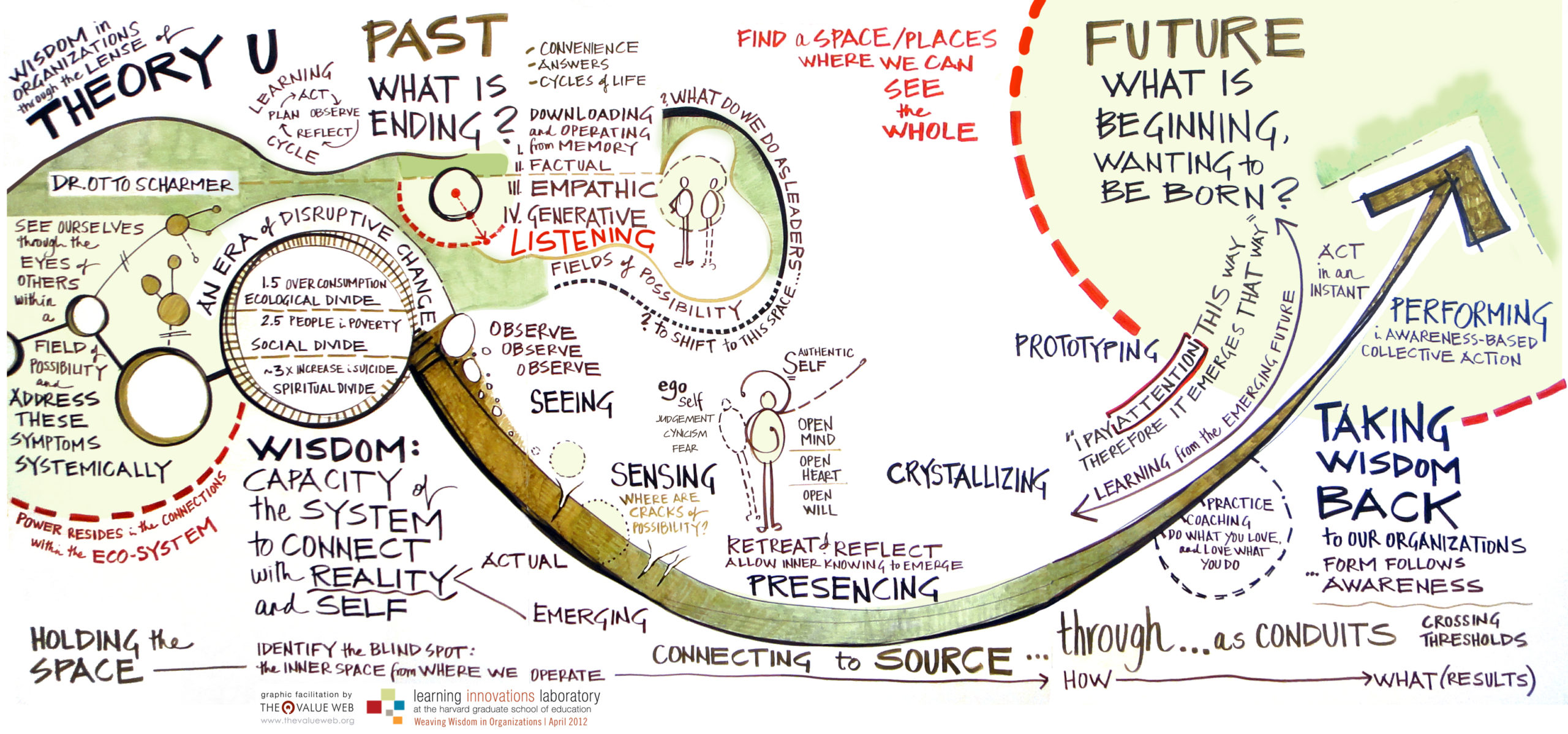 Dr. C. Otto Scharmer, Senior Lecturer at MIT and founding chair of the Presencing Institute, opened his presentation with a thought-provoking definition of wisdom as “the capacity to be in touch with reality and to connect with the self.” He emphasized that reality is both what exists in the present and what is emerging—a field of possibilities. However, organizations, especially large ones, often operate in bubbles that disconnect them from this evolving reality.
Dr. C. Otto Scharmer, Senior Lecturer at MIT and founding chair of the Presencing Institute, opened his presentation with a thought-provoking definition of wisdom as “the capacity to be in touch with reality and to connect with the self.” He emphasized that reality is both what exists in the present and what is emerging—a field of possibilities. However, organizations, especially large ones, often operate in bubbles that disconnect them from this evolving reality.
To illustrate the need for a new approach to learning and leadership, Scharmer invited participants to reflect on two questions:
- Where do you experience a world that is ending?
- Where do you experience a world that is beginning?
Through this exercise, he highlighted a growing sentiment that society must move in a new direction. He argued that traditional leadership models—rooted in reflecting on the past—are insufficient for navigating today’s disruptive change. Instead, leaders must “learn from the future as it emerges,” a concept he calls presencing.
Presencing and the Power of Listening
Presencing is an inner shift in awareness, where leaders move beyond habitual thinking and ego-driven reactions to connect deeply with emerging possibilities. A crucial aspect of this shift is listening, which Scharmer described as “the most underrated concept in leadership today.” He outlined four levels of listening:
- Downloading – Hearing only what confirms existing beliefs.
- Factual Listening – Paying attention to new or disconfirming information.
- Empathic Listening – Seeing through another’s perspective and suspending one’s own agenda.
- Generative Listening – Sensing what is emerging and helping bring it into reality.
To demonstrate generative listening, Scharmer shared a powerful clip of conductor Zubin Mehta leading two orchestras playing together for the first time. Mehta’s leadership was not about control but about creating space for a collective performance to emerge—an analogy for how leaders must cultivate environments that foster creativity and transformation.
Theory U: A Framework for Leading Change
Scharmer then introduced Theory U, a framework for transformation that guides individuals and organizations through a process of deep awareness and renewal:
- Awareness is the intervention point – The way we listen shapes what we see and do.
- Get out of the institutional and personal bubble – Pay attention to emerging reality.
- Engage with an open mind, open heart, and open will – These three dimensions enable breakthrough insights.
- Integrate past and future selves – Leadership is about merging who we have become with who we have the potential to be.
- Overcome the three barriers to transformation – The voice of judgment (which blocks new thinking), the voice of cynicism (which suppresses possibilities), and the voice of fear (which prevents action).
Scharmer concluded that Theory U extends beyond individuals—it applies to organizations, institutions, and global systems. He urged leaders to embrace co-creation, as the challenges of our time require innovations that no single entity can achieve alone.
A Call to Action
To close the session, Scharmer guided participants through a journaling exercise, asking them to write freely in response to thought-provoking questions. He encouraged them to incorporate moments of intentional stillness into their daily lives, tuning out noise to stay connected to what is emerging.
His final message: “The creative moment arrives on its own schedule. Hold the space for it, trust the process, and step courageously into the unknown.”
